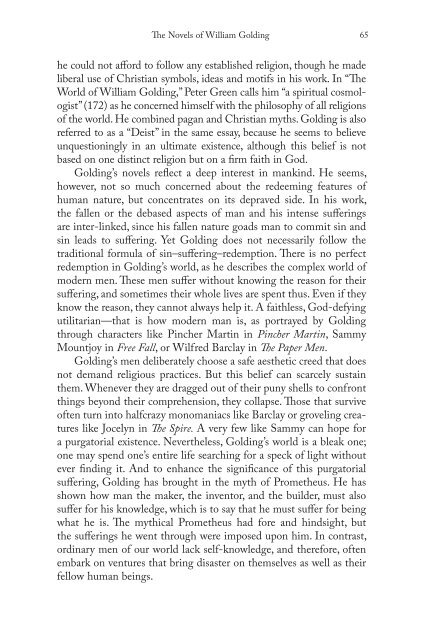Blooms Literary Themes - THE TRICKSTER.pdf - ymerleksi - home
Blooms Literary Themes - THE TRICKSTER.pdf - ymerleksi - home
Blooms Literary Themes - THE TRICKSTER.pdf - ymerleksi - home
You also want an ePaper? Increase the reach of your titles
YUMPU automatically turns print PDFs into web optimized ePapers that Google loves.
Th e Novels of William Golding 65<br />
he could not aff ord to follow any established religion, though he made<br />
liberal use of Christian symbols, ideas and motifs in his work. In “Th e<br />
World of William Golding,” Peter Green calls him “a spiritual cosmologist”<br />
(172) as he concerned himself with the philosophy of all religions<br />
of the world. He combined pagan and Christian myths. Golding is also<br />
referred to as a “Deist” in the same essay, because he seems to believe<br />
unquestioningly in an ultimate existence, although this belief is not<br />
based on one distinct religion but on a fi rm faith in God.<br />
Golding’s novels refl ect a deep interest in mankind. He seems,<br />
however, not so much concerned about the redeeming features of<br />
human nature, but concentrates on its depraved side. In his work,<br />
the fallen or the debased aspects of man and his intense suff erings<br />
are inter-linked, since his fallen nature goads man to commit sin and<br />
sin leads to suff ering. Yet Golding does not necessarily follow the<br />
traditional formula of sin–suff ering–redemption. Th ere is no perfect<br />
redemption in Golding’s world, as he describes the complex world of<br />
modern men. Th ese men suff er without knowing the reason for their<br />
suff ering, and sometimes their whole lives are spent thus. Even if they<br />
know the reason, they cannot always help it. A faithless, God-defying<br />
utilitarian—that is how modern man is, as portrayed by Golding<br />
through characters like Pincher Martin in Pincher Martin, Sammy<br />
Mountjoy in Free Fall, or Wilfred Barclay in Th e Paper Men.<br />
Golding’s men deliberately choose a safe aesthetic creed that does<br />
not demand religious practices. But this belief can scarcely sustain<br />
them. Whenever they are dragged out of their puny shells to confront<br />
things beyond their comprehension, they collapse. Th ose that survive<br />
often turn into halfcrazy monomaniacs like Barclay or groveling creatures<br />
like Jocelyn in Th e Spire. A very few like Sammy can hope for<br />
a purgatorial existence. Nevertheless, Golding’s world is a bleak one;<br />
one may spend one’s entire life searching for a speck of light without<br />
ever fi nding it. And to enhance the signifi cance of this purgatorial<br />
suff ering, Golding has brought in the myth of Prometheus. He has<br />
shown how man the maker, the inventor, and the builder, must also<br />
suff er for his knowledge, which is to say that he must suff er for being<br />
what he is. Th e mythical Prometheus had fore and hindsight, but<br />
the suff erings he went through were imposed upon him. In contrast,<br />
ordinary men of our world lack self-knowledge, and therefore, often<br />
embark on ventures that bring disaster on themselves as well as their<br />
fellow human beings.

















